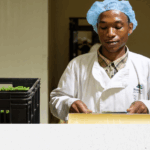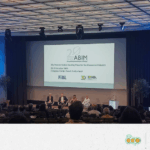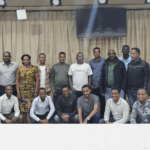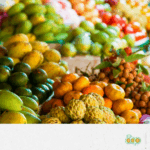- 13/05/2024
- Posted by: Sandra Borma
- Category: News
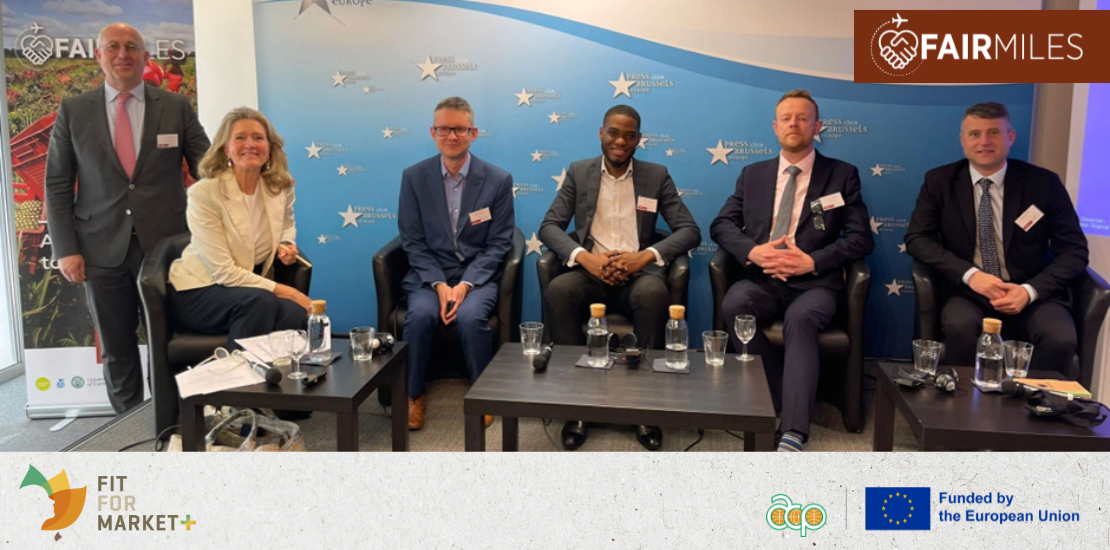
SHOULD FRESH PRODUCE IMPORTS INTO EUROPE BE BANNED? THE FAIRMILES CONSORTIUM IS BROADENING THE DIALOGUE NEEDED FOR GREATER CLIMATE JUSTICE.
The event, which took place both online and in person in Brussels on Tuesday 30 April, brought together more than 200 representatives from retail, food companies, NGOs and government to explore the following issues:
- The impact of airfreighted fresh horticultural products from developing countries.
- Climate justice considerations for companies’ net zero strategies
- To ban or not to ban: should we ban airfreighted fresh produce to achieve Net Zero?
Speakers included:
- Simon Derrick, Head of Sustainability at Blue Skies Holdings Ltd
- Steven Kerignard, Supply Chain Manager for LECOFRUIT in Madagascar- Clement Tulezi, CEO Kenya Flower Council (KFC)
- Martijn Boelen, Head of Sector Trade, Directorate General for International Partnerships, European Commission
- Dr Ebenezer Laryea, Associate Professor of International Law for Sustainable Development, University of Northampton
- James MacGregor, Development economist and author of ‘Fair Miles: recharting the food miles map’, published by IIED and Oxfam.
- Jeremy Knops, Delegate General of COLEAD
The round table was moderated by Simone van Trier.
The latest research from Fairmiles presented by James Mac Gregor and Dr Laryea estimates that 20 million people in developing countries benefit from fresh produce exported by air to European markets. The research builds on an earlier study conducted in 2023, which found that at least 5 million people in Africa rely on airfreighted horticultural products, based on research conducted mainly in East Africa. The full results of the research were presented at the roundtable. They are available here together with the full presentation.
Simon Derick, founding member of the Fairmiles Consortium, stressed that “this latest research further underlines the important impact that airfreighted fresh produce has in developing countries and that we have a crucial responsibility to ensure a proper, balanced debate on the issue to ensure that we can achieve net zero without unintended consequences for vulnerable communities”.
Jeremy Knops, General Delegate at COLEAD said “Agricultural export value chains are fundamental for low-income countries. Banning airfreight would have devastating consequences, leading to significant job losses and loss of income for some of the most vulnerable people in global supply chains”. Steven Kerignard from Madagascar illustrated the point: “Without fresh produce by air, a whole value chain would disappear in Madagascar. Not only for the producers, but for all the service providers involved”. Also Jeremy Knops reminded that there are a number of positive impacts of export value chains beyond jobs and additional revenues for farmers, ranging from improved food security and sustainable farming practices for crops sold on domestic markets, to professionalisation of support services, labour mobility, entrepreneurship, access to innovation and technology or government capacity.”
Martijn Boelen of INTPA put the debate into perspective: “To solve the problem of climate change, we need to look at the big picture (all sectors, from production to market, including logistics). Logistics is one of the components of the problem” and “what we are doing in the EU is trying to make carbon more expensive”. When speaking about measures being taken by the European Union to flight climate change, he also said “What you do not hear is that we, as the EC, forbid to forbid stuff. We make things more expensive; we make sure there is a level playing field…. but what we will not do, I’ve not seen any proposals ever, is to say ‘ok you cannot fly in fresh produce anymore”.
| Issues that emerged from the roundtable highlighted the need to consider climate justice and ethics in relation to the most vulnerable countries. -> Farmers and vulnerable people in developing countries are already bearing the brunt of climate change, despite being least responsible for it. -> This raises the question of whether it is fair to introduce a policy that disproportionately affects the livelihoods of these same people, rather than looking at reducing CO2 emissions in other parts of the supply chain. -> Transport of all food accounts for 1.56% of total global CO2e emissions. Of this, only 0.16% is transported by air. -> The majority of fresh produce transported by air is carried in the belly holds of passenger aircraft. Without fresh produce, these planes would still be flying and the belly holds would be filled with other cargo. -> Faced with increasing restrictions, exporters in developing countries may be forced to explore alternative markets to Europe, which may be less demanding and potentially less lucrative for the livelihoods that depend on them. |
At the end of the roundtable, everyone agreed that creating such a space for dialogue through initiatives such as Fairmiles makes it possible to reach balanced decisions on sensitive issues, especially for the most vulnerable countries, by involving all the stakeholders concerned. So the dialogue must and will continue.
Fairmiles is made up of organisations representing fresh produce companies, academia and the international development sector. Its aim is to develop a fair and equitable strategy, in line with the principles of climate justice, to ensure that we achieve net zero without denying vital market access to producers in developing countries. Founding partners include the ODI, the University of Northampton, the University of Exeter, COLEAD, Beanstalk.Global and Blue Skies.
The event was organised as part of the Fit For Market Plus programme.
For more information, please visit www.fairmiles.org or contact simon.derrick@blueskies.com
This activity is supported by the Fit For Market Plus (FFM+) programme, implemented by COLEAD within the Framework of Development Cooperation between the Organisation of African, Caribbean and Pacific States (OACPS) and the European Union. This publication receives financial support from the European Union and the OACPS. The content of this publication is the sole responsibility of COLEAD and can in no way be taken to reflect the views of the European Union or the OACPS.

